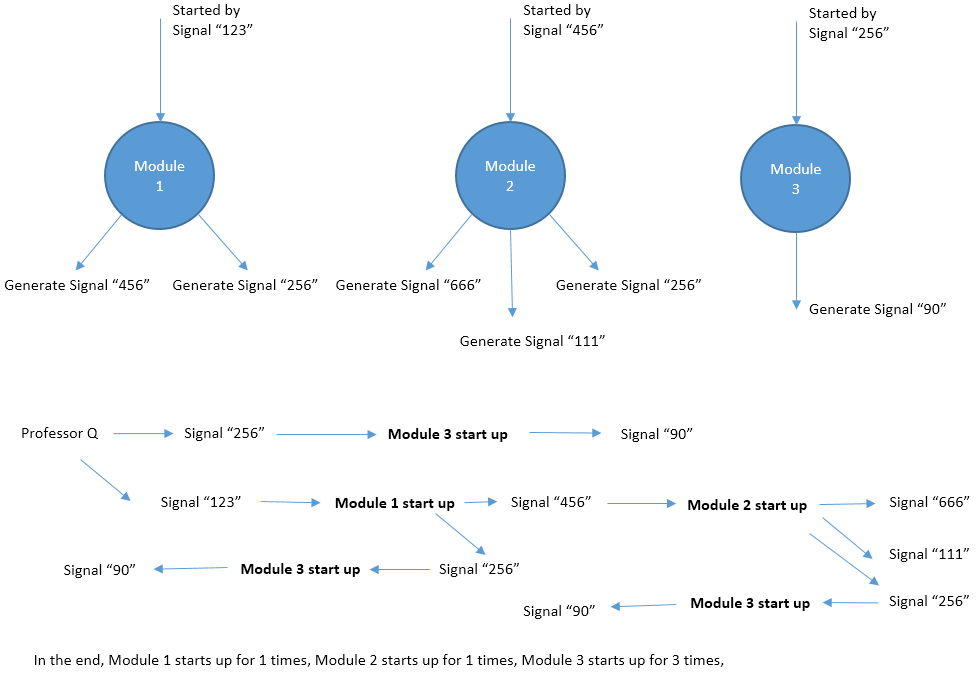Professor Q's Software
時間限制:10000ms
單點時限:1000ms
記憶體限制:256MB
描述
Professor Q develops a new software. The software consists of N modules which are numbered from 1 to N. The i-th module will be started up by signal Si. If signal Si is generated multiple times, the i-th module will also be started multiple times. Two different modules may be started up by the same signal. During its lifecircle, the i-th module will generate Ki signals: E1, E2, …, EKi. These signals may start up other modules and so on. Fortunately the software is so carefully designed that there is no loop in the starting chain of modules, which means eventually all the modules will be stoped. Professor Q generates some initial signals and want to know how many times each module is started.

輸入
The first line contains an integer T, the number of test cases. T test cases follows.
For each test case, the first line contains contains two numbers N and M, indicating the number of modules and number of signals that Professor Q generates initially.
The second line contains M integers, indicating the signals that Professor Q generates initially.
Line 3~N + 2, each line describes an module, following the format S, K, E1, E2, … , EK. S represents the signal that start up this module. K represents the total amount of signals that are generated during the lifecircle of this module. And E1 … EK are these signals.
For 20% data, all N, M <= 10
For 40% data, all N, M <= 103
For 100% data, all 1 <= T <= 5, N, M <= 105, 0 <= K <= 3, 0 <= S, E <= 105.
Hint: HUGE input in this problem. Fast IO such as scanf and BufferedReader are recommended.
輸出
For each test case, output a line with N numbers Ans1, Ans2, … , AnsN. Ansi is the number of times that the i-th module is started. In case the answers may be too large, output the answers modulo 142857 (the remainder of division by 142857).
樣例輸入
3
3 2
123 256
123 2 456 256
456 3 666 111 256
256 1 90
3 1
100
100 2 200 200
200 1 300
200 0
5 1
1
1 2 2 3
2 2 3 4
3 2 4 5
4 2 5 6
5 2 6 7
樣例輸出
1 1 3
1 2 2
1 1 2 3 5
- 方法一:使用棧進行處理,該方法邏輯簡單,容易寫程式碼
#include <vector>
#include <stack>
#include <iostream>
using namespace std;
void find (int** a, int len, int b, vector<int>& next);
int main()
{
int T = 0;
int N = 0, M = 0;
cin >> T;
for(int i = 0; i < T; ++i)
{
// N: module num; M: init num
cin >> N >> M;
// get the init
int* init = new int[M]();
for (int j = 0; j < M; ++j)
cin >> init[j];
// get the modules
int** mods = new int*[N];
for (int j = 0; j < N; ++j)
{
int modId = 0, childNum = 0;
cin >> modId >> childNum;
mods[j] = new int[childNum + 2]();
mods[j][0] = modId;
mods[j][1] = childNum;
for (int k = 0; k < childNum; ++k)
cin >> mods[j][k+2];
}
int* cnt = new int[N]();
stack<int> s;
vector<int> next;
for (int j = 0; j < M; ++j)
s.push(init[j]);
while (!s.empty())
{
next.clear();
find(mods, N, s.top(), next);
s.pop();
for (vector<int>:: iterator iter = next.begin(); iter != next.end(); ++iter)
{
cnt[*iter]++;
for (int j = 0; j < mods[*iter][1]; ++j)
s.push(mods[*iter][2+j]);
}
}
for (int j = 0; j < N; ++j)
cout << cnt[j] << " ";
cout << endl;
// release memory
delete[] init;
for (int j = 0; j < N; ++j)
delete[] mods[j];
delete[] cnt;
}
}
void find (int** a, int len, int b, vector<int>& next)
{
for (int i = 0; i < len; ++i)
{
if (b == a[i][0])
next.push_back(i);
}
}- 方法二:最簡單直接的查詢方法,這個要求寫程式碼時要留意別處理出錯。
#include <vector>
#include <iostream>
using namespace std;
void get (int** a, int len, int line, int* cnt);
void find (int** a, int len, int b, vector<int>& next);
int main()
{
int T = 0;
int N = 0, M = 0;
cin >> T;
for(int i = 0; i < T; ++i)
{
// N: module num; M: init num
cin >> N >> M;
// get the init
int* init = new int[M]();
for (int j = 0; j < M; ++j)
cin >> init[j];
// get the modules
int** mods = new int*[N];
for (int j = 0; j < N; ++j)
{
int modId = 0, childNum = 0;
cin >> modId >> childNum;
mods[j] = new int[childNum + 2]();
mods[j][0] = modId;
mods[j][1] = childNum;
for (int k = 0; k < childNum; ++k)
cin >> mods[j][k+2];
}
int* cnt = new int[N]();
for (int j = 0; j < M; ++j)
{
vector<int> next;
find(mods, N, init[j], next);
for (vector<int>::iterator iter = next.begin(); iter != next.end(); ++iter)
{
cnt[*iter]++;
get (mods, N, *iter, cnt);
}
}
for (int j = 0; j < N; ++j)
cout << cnt[j] << " ";
cout << endl;
}
}
void get (int** a, int len, int line, int* cnt)
{
for (int i = 0; i < a[line][1]; ++i)
{
vector<int> next;
find(a, len, a[line][i+2], next);
for (vector<int>::iterator iter = next.begin(); iter != next.end(); ++iter)
{
cnt[*iter]++;
get(a, len, *iter, cnt);
}
}
}
void find (int** a, int len, int b, vector<int>& next)
{
for (int i = 0; i < len; ++i)
{
if (b == a[i][0])
next.push_back(i);
}
}